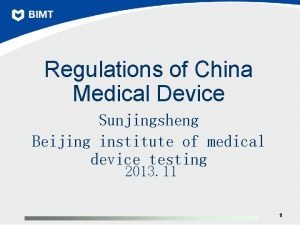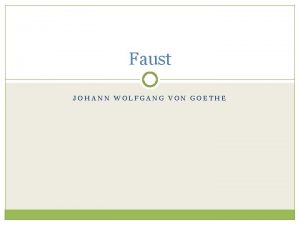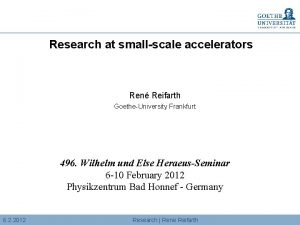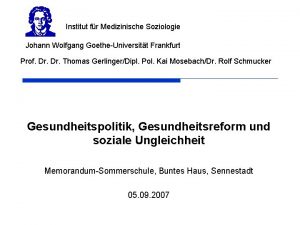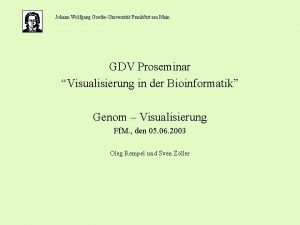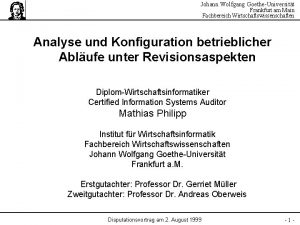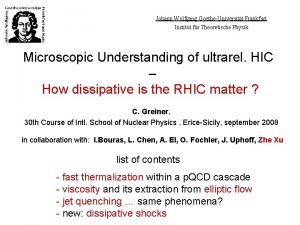Institute of Medical Sociology Johann Wolfgang GoetheUniversity Frankfurt












- Slides: 12

Institute of Medical Sociology Johann Wolfgang Goethe-University Frankfurt Prof. Dr. Thomas Gerlinger European Integration, the Open Method of Coordination and the Future of European Health Policy 14 th Conference of the International Association of Health Policy Europe (IAHPE) Thessaloniki, 25 th to 29 th May 2005

Contents 1. Health Policy in Europe – A Domain of the Nation-States 2. The “Lisbon Strategy” and OMC 3. OMC’s Presumable Impact on Health Policy 4. Conclusion and Outlook 2

EU‘s Main Obligations in Health Policy • direct attention to improving the health of the population • ensure a high level of health protection in all fields of Community policy 3

Nation-States‘ Competencies in Health Policy • type and extent of coverage in case of illness • organization of services • • institutional structures • division of labour mode of regulation of the health care system 4

EU‘s Competencies in Health Policy • • subsidiary role • promote cooperation • complement national policies explicit regulatory authority • health and safety at work • consumer protection 5

Lisbon Strategy: Objective “the most competitive and dynamic knowledge-based economy in the world” 6

Core Elements of OMC • setting of guidelines including a timetable for short-, medium-, and long-term objectives • establishment of quantitative and qualitative indicators and benchmarks to ease comparison of national practices • adoption of European guidelines in the policies of the Member States • regular supervision, evaluation, and mutual examination 7

OMC: A New Mode of Regulation • change by coordination and learning • dispensation with binding targets and formal sanctions • formal authority left with the Member States 8

Objectives of OMC in Health Policy • establishment of universal access to highquality health care • increased transparency and quality of the health care systems • continuation of reforms aimed at cost containment 9

Impact of OMC on Health Policy • problems specific to the area of health policy • policy-related goal conflicts • ensuring a high level of social protection and open access to health services (implying a high level of public spending) or • • cost containment by privatizing costs and restricting access to health services acceleration of reform and rationalization 10

Renewal of the Lisbon Strategy • even stronger focus on growth and employment • closer connection between economic and social policy (including health policy) • national reform programs to meet European targets • integration of all aspects relevant for competition policy into one report 11

Conclusions and Outlook • increasing pressure for reform of health care systems deriving from the EU • potential for rationalization of services • probable future priority for cost containment through • privatization of costs • further restrictions for unhindered access to services 12
 Johann wolfgang dobereiner
Johann wolfgang dobereiner Interpretation gefunden goethe
Interpretation gefunden goethe Johann wolfgang von goethe plays
Johann wolfgang von goethe plays Tagebucheintrag faust
Tagebucheintrag faust Peace research institute frankfurt
Peace research institute frankfurt Kailit
Kailit Target institute of medical education and research
Target institute of medical education and research Pima medical institute dress code
Pima medical institute dress code Beijing medical equipment institute
Beijing medical equipment institute Walter benjamin escuela de frankfurt
Walter benjamin escuela de frankfurt Ghrf frankfurt
Ghrf frankfurt Oranienburg map
Oranienburg map Congresso ciam
Congresso ciam








